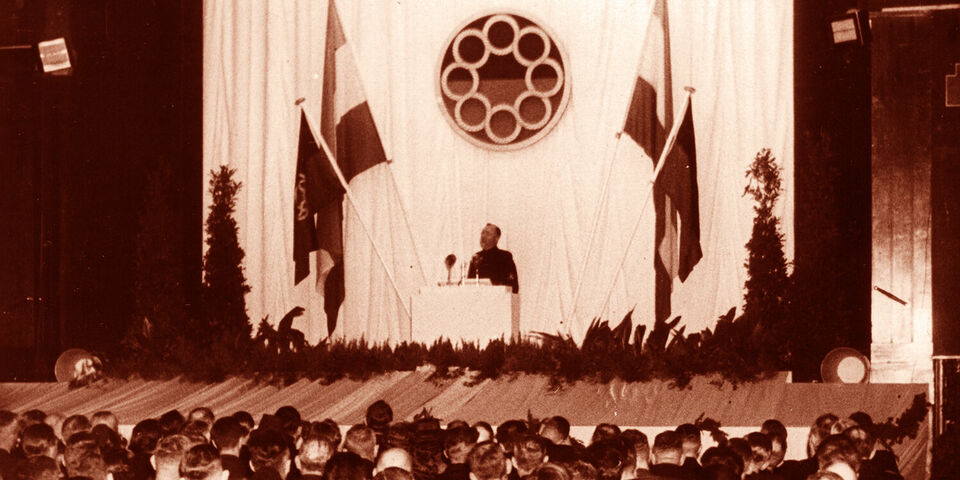Anton Mussert’s Technical Guild
“The role of technology as envisioned by totalitarian systems has always fascinated me,” says Hans Schippers. The researcher spent a quarter century working as a technology historian at TU/e until his retirement in 2012. In April, he published his book “Technici en de totalitaire verleiding” [Technicians and the totalitarian temptation], which describes how the National Socialist Movement (NSB) tried to bring professional organizations of technicians “into line”, i.e. to place them under their control, during World War II.
National Socialism and Fascism - both totalitarian movements - saw technology as a means of establishing a powerful state. “According to their ideology, products of technology should benefit the people, not capitalists - especially because in their view, this latter group included many Jews,” Schippers explains. “It was then left to the party, which represented the people, to fill in the role of technology.”
And such views were not exclusive to right-wing movements, for that matter: “Communism adopted a similar stance, albeit with a different line of reasoning: technology was necessary for the realization of a classless society.”
Hans Schippers obtained his PhD through research on several radical right-wing movements. Afterwards, while working at TU/e, he became fascinated by the history of technology. In Technici en de totalitaire verleiding, both lines of research come together. “In the book, I focus on the situation in the Netherlands, which has not been studied much.”
In Germany and Italy, professional associations of technicians were “brought into line” in the period before World War II, explains Schippers, “which means they were placed under the control of the regime.” This was accepted because it provided members with economic security and prestige. But what was the situation like in the Netherlands?
KIVI
In order to expand the social influence of the National Socialist Movement (NSB), party leader Anton Mussert set up several so-called Guilds and Fronts during the first few years of the war, including the Technical Guild. This way, Mussert - who was a civil engineer himself - sought to gain control over organizations in which technicians united.
The largest of these associations was the Royal Institution of Engineers in the Netherlands (KIVI), which is still active today. “Among the three thousand members of KIVI were many engineers from Delft, but also technicians who had been trained abroad, and engineers who worked at Philips in Eindhoven.”
In June 1941, the Germans replaced KIVI’s board. From that point on, Jews were no longer allowed to be members. Schippers: “The dismissed former board advised the members to politely decline the wind of change that was about to sweep through the organization.” This resulted in a significant loss of members: its membership shrank to several hundred. So the attempted coup was not a great success.
The Technical Guild itself had some two thousand members with a secondary-level or higher-level technical education, or a position at that level. Where were they from? “Some had studied in Germany where they had come to be impressed by National Socialism,” says Schippers. His research shows that most of the members lived in and around Amsterdam, Rotterdam, The Hague, the Gooi region and the border province of Limburg.
The already large numbers of engineers found in Eindhoven at the time, because of Philips, proved “not particularly susceptible” to the Guild’s appeal, Schippers says. “National Socialism gained less of a foothold in North Brabant due to opposition from the influential Catholic Church.”
Dorgelo
However, the lack of enthusiasm for the Technical Guild did not mean that all engineers were highly critical of their employers: many technicians worked for companies that contributed to the war industry, either involuntarily or not, such as shipyards, Fokker and Philips. “Some looked for a job elsewhere, but many felt they had no other option: they had a family.’
What is also striking is that a quarter of all Delft students signed a declaration that they would not revolt against the occupiers. “At other institutions, this percentage was between 3% and 4%. The Delft engineers signed on the advice of the board of the Technical College.
Hendrik Dorgelo was as rector also part of the Delft TC board at the time. He would go on to become the first rector of THE, the predecessor of TU/e. (Note: added by Cursor, Schippers does not mention Dorgelo in the book, Ed).
Studium Generale
In the later war years, the activities of the Technical Guild came to a halt, as more and more members left for Germany, initially to work in the war industry, later because they fled.
Something that Schippers also observed during his research is that from the late 1940s onwards, reforms were made in higher technical education, which can be linked to the events that occurred during wartime.
“Also in view of the next threat - communism - the aim was to make engineers resilient by providing them with a broader social outlook.” This was promoted in Delft and later in Eindhoven and Enschede as well by establishing Studium Generale departments, and offering education that linked engineering to society.
Climate crisis
And as always, there are lessons to be drawn from history for the present day. “Engineers sometimes have little regard for developments outside their field, while politicians often know little about technology.” Such vacuums are one reason why populist movements with sometimes clearly anti-democratic leanings are able to expand their power, Schippers argues.
“We saw that in the lead-up to World War II, and it could happen again in a different way with regard to the climate crisis - a problem with both social and technical aspects, for which there is no simple solution.” In Schippers’ view, therefore, engineers and politicians should enter into conversation with each other, “to listen to each other and learn from each other.”
Technici en de totalitaire verleiding (2023), Hans Schippers, Walburg Pers Publishers, 165 pages, ISBN 978 94 6249 957 7





Discussion